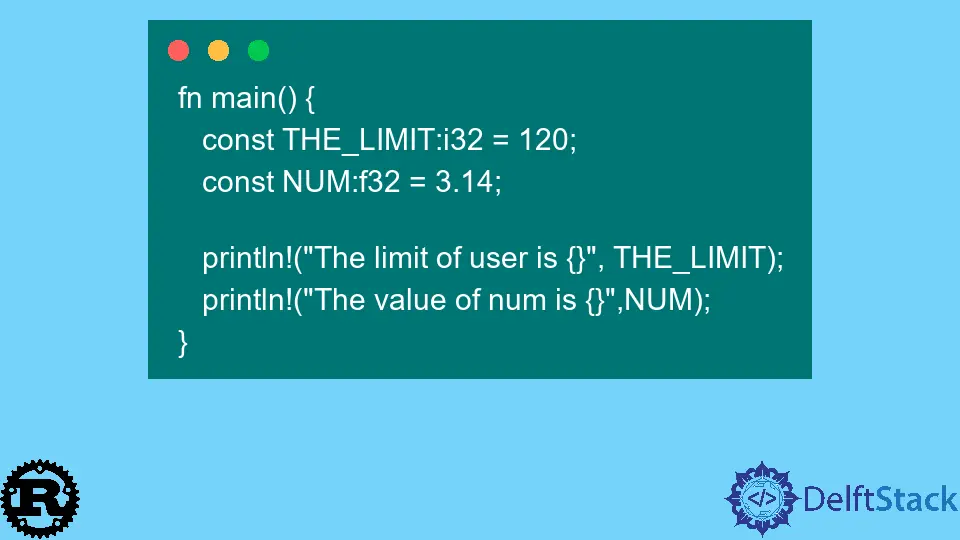const() in Rust

Rust is a powerful systems programming language that emphasizes safety, concurrency, and performance. One of its unique features is the const keyword, which allows developers to define constant values that are evaluated at compile time. This capability can lead to more efficient code, as it enables the compiler to optimize and eliminate unnecessary calculations during runtime.
In this tutorial, we will delve into the intricacies of const() in Rust, covering its syntax, use cases, and best practices. Whether you are a seasoned Rustacean or just starting your journey with Rust, this guide will provide you with valuable insights into leveraging const() effectively.
What is const() in Rust?
In Rust, the const keyword is used to declare constant values that are immutable and must be known at compile time. Unlike variables declared with let, which can change, constants defined with const remain fixed throughout the program’s execution. This immutability is crucial for ensuring that certain values remain stable, which can help prevent bugs and enhance code clarity.
Constants can be of any type, including primitive types, arrays, and even functions. They are defined using the const keyword followed by a name, a type annotation, and an expression that computes the value. Here’s a simple example:
const MAX_CONNECTIONS: u32 = 100;
fn main() {
println!("The maximum number of connections is: {}", MAX_CONNECTIONS);
}
In this code, we declare a constant MAX_CONNECTIONS of type u32, which is set to 100. The println! macro then prints this value to the console.
Output:
The maximum number of connections is: 100
Using const helps in defining values that are intended to remain unchanged and can be used throughout the program, improving maintainability and readability.
Benefits of Using const()
Utilizing const() in Rust comes with several advantages that can significantly improve your code. First and foremost, compile-time evaluation ensures that constants are computed before the program runs, leading to faster execution times. Since these values are immutable, they help prevent accidental changes, making your code more predictable and less prone to bugs.
Another benefit is that constants can be used in array sizes, pattern matching, and other contexts where a constant expression is required. This flexibility allows developers to write more generic and reusable code. Additionally, because constants are evaluated at compile time, they can be used in other constant expressions, enabling complex calculations to be precomputed.
For example, consider the following code that uses a constant in an array definition:
const SIZE: usize = 5;
fn main() {
let arr: [i32; SIZE] = [1, 2, 3, 4, 5];
println!("{:?}", arr);
}
In this snippet, we define a constant SIZE and use it to initialize an array. This ensures that the array size is fixed and known at compile time.
Output:
[1, 2, 3, 4, 5]
By using const, you can create robust and efficient code that leverages the power of Rust’s compile-time features.
Best Practices for Using const()
To maximize the benefits of const() in Rust, it’s essential to follow some best practices. First, always use const for values that are truly constant and will not change throughout the program. This practice not only aids in code readability but also prevents potential bugs associated with mutable state.
Second, choose meaningful names for your constants. This makes your code self-documenting, allowing other developers (and your future self) to understand the purpose of the constant at a glance. For example, instead of naming a constant X, consider naming it MAX_USERS to convey its intent clearly.
Third, keep your constants organized. Group related constants together in modules or structs to enhance maintainability. For instance, you might create a module for configuration constants, making it easier to manage them in one place.
Here’s an example of organizing constants in a module:
mod config {
pub const MAX_USERS: u32 = 100;
pub const TIMEOUT: u32 = 30;
}
fn main() {
println!("Max users: {}", config::MAX_USERS);
println!("Timeout: {}", config::TIMEOUT);
}
Output:
Max users: 100
Timeout: 30
By following these best practices, you can ensure that your use of const is both effective and efficient, leading to cleaner and more maintainable code.
Conclusion
The const() feature in Rust is a powerful tool for defining immutable values that are evaluated at compile time. By using constants effectively, you can enhance the performance, readability, and maintainability of your code. Remember to follow best practices, such as using meaningful names and organizing your constants, to get the most out of this feature. Whether you are building small applications or large systems, understanding and utilizing const() will undoubtedly improve your Rust programming experience.
FAQ
-
What is the difference between const and let in Rust?
const defines a constant value that cannot change, while let creates a variable that can be reassigned. -
Can const values be used in array sizes?
Yes, const values can be used to define the size of arrays, ensuring they are known at compile time. -
Are const values mutable?
No, const values are immutable and cannot be changed after they are defined. -
Can const be used for complex types?
Yes, const can be used for complex types, including arrays and structs, as long as they can be evaluated at compile time. -
How does using const improve performance?
Since const values are evaluated at compile time, it reduces the need for runtime calculations, leading to faster execution.